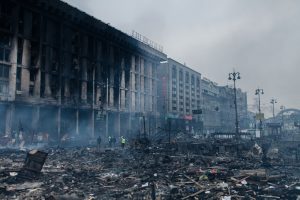Nobody knows how and when the war in Ukraine will end. But what we do know is that, at the time of Ukraine’s choosing, it will end through peace negotiations. When that time comes, Mongolia is in a unique position to facilitate talks between Ukraine and Russia.
For any high-stake negotiation to succeed, it should take place at a location where both sides feel comfortable. This was why the two summits between North Korea’s Kim Jong Un and the United States’ Donald Trump took place in Singapore and Vietnam – countries that kept their diplomatic doors open to both sides. At the moment, there are not many countries where both Ukraine and Russia would feel comfortable negotiating.
Mongolia is the only functioning democracy in the entire continental Eurasian expanse, stretching from South Korea to Ukraine. Mongolia has maintained close diplomatic and military ties with the West. As a “democratic oasis” in between two of the most autocratic countries on earth, Mongolians empathize with the plight and aspiration of Ukrainians more than anyone.
Yet Mongolia is 90 percent energy dependent from Russia. Mongolia’s abstentions on the U.N. votes on Ukraine were the best Ulaanbaatar could do given the circumstances. Mongolia also did not impose any sanctions on Russia.
Mongolia has also hosted thousands of Russians since the war started. Every Russian who is in Mongolia is a Russian who is not fighting in Ukraine. This is Mongolia’s quiet contribution to ending the war.
There are also close personal ties among Mongolia’s political elites to both Russia and Ukraine. Among the four Mongolian presidents who studied abroad, two were trained in today’s Russia and the other two were educated in western Ukraine. Ukrainian President Volodymyr Zelenskyy himself spent three years of his childhood in Mongolia. His father was an important figure in developing Mongolia’s major Erdenet copper mine. Ukrainian culture and people have a significant place in Mongolia.
Mongolia’s open foreign policy and improbable democracy make it an attractive place to facilitate bilateral negotiations. For example, before the recent global pandemic, Japan and North Korea intelligence officials held a secret meeting in Mongolia. This is just one of the publicly known negotiations. Mongolia was also a close contender to host the Kim-Trump summit in 2018.
Our geographic constraints force us not to be hostile against Russia. But our democratic predilections make us see what Russia is doing in Ukraine as reprehensible. There are a few countries in a similar position, but many of them have unashamedly benefited from this war. Mongolia is a unique country in this respect, which is genuinely interested in facilitating a lasting peace between Ukraine and Russia.
Mongolians want the war in Ukraine to end as soon as possible. Hosting the eventual Russia-Ukraine negotiations would be our way of contributing to the peace. We hope this will not only help uphold the rules-based world order, but offer a homecoming for Zelenskyy to his childhood home Mongolia.
































